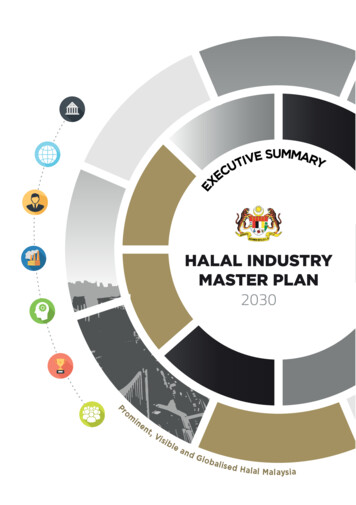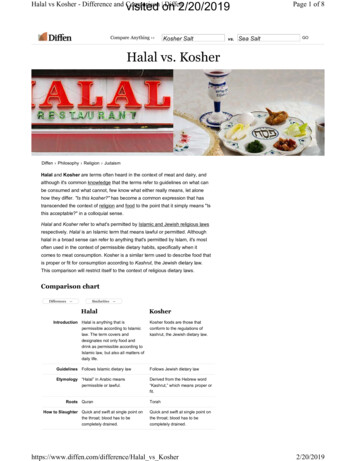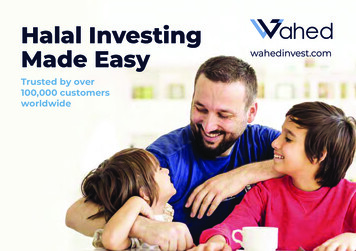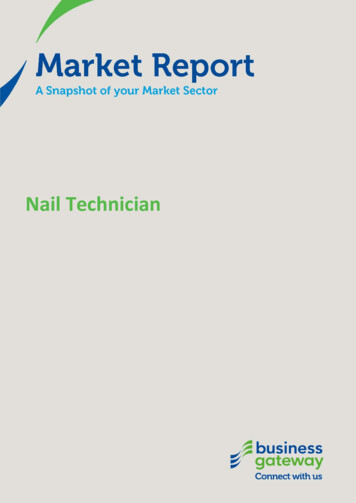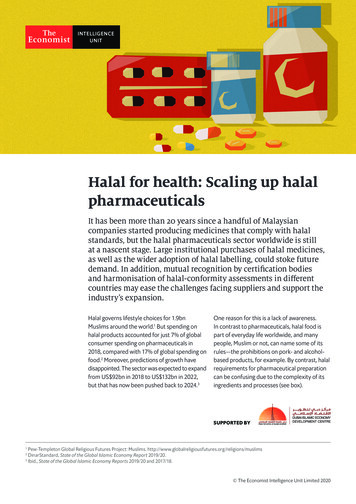
Transcription
Halal for health: Scaling up halal pharmaceuticalsHalal for health: Scaling up halalpharmaceuticalsIt has been more than 20 years since a handful of Malaysiancompanies started producing medicines that comply with halalstandards, but the halal pharmaceuticals sector worldwide is stillat a nascent stage. Large institutional purchases of halal medicines,as well as the wider adoption of halal labelling, could stoke futuredemand. In addition, mutual recognition by certification bodiesand harmonisation of halal-conformity assessments in differentcountries may ease the challenges facing suppliers and support theindustry’s expansion.Halal governs lifestyle choices for 1.9bnMuslims around the world.1 But spending onhalal products accounted for just 7% of globalconsumer spending on pharmaceuticals in2018, compared with 17% of global spending onfood.2 Moreover, predictions of growth havedisappointed. The sector was expected to expandfrom US 92bn in 2018 to US 132bn in 2022,but that has now been pushed back to 2024.3One reason for this is a lack of awareness.In contrast to pharmaceuticals, halal food ispart of everyday life worldwide, and manypeople, Muslim or not, can name some of itsrules—the prohibitions on pork- and alcoholbased products, for example. By contrast, halalrequirements for pharmaceutical preparationcan be confusing due to the complexity of itsingredients and processes (see box).SUPPORTED BYPew-Templeton Global Religious Futures Project: Muslims. slimsDinarStandard, State of the Global Islamic Economy Report 2019/20.3Ibid., State of the Global Islamic Economy Reports 2019/20 and 2017/18.12 The Economist Intelligence Unit Limited 20201
Halal for health: Scaling up halal pharmaceuticalsDefining halal pharmaceuticals4Pharmaceuticals are halal if:1. Ingredients are safe and free from ethanol, blood, pork, parts of carnivorous andomnivorous animals, and human parts.2. Maximum hygiene and minimum contamination with any potential toxic, najis(ritually unclean) or khabith (impure) ingredients are applied.3. The process of cultivation, manufacture, preparation, packaging, storage anddistribution are ensured to be clean, pure and compliant with Sharia.4. Every element of halal production is physically separated from non-halal production.5. Any potential cross-contamination between halal and non-halal ingredients andproducts is avoided.Perhaps most importantly, Islamic law allowsfor the consumption of non-halal productsin life-threatening situations. As manymedications are arguably meant to preventthe occurrence of life-threatening situations,the halal question is often seen as irrelevantwhen it comes to drugs. As a result, halalpharmaceuticals have largely been unexploredby Muslims.5But there are aspects of pharmaceuticalsthat may be of concern to halal-consciousconsumers. Some medicines and vaccinescontain animal material, including cell lines(such as E. coli, yeast and animal cells) andrecombinant genes, as well as animal- oralcohol-derived ingredients, according toJames Noh, president of the Korea Instituteof Halal Industry (KIHI), a halal productpromotion organisation that works with SouthKorean producers. Raising awareness ofthese elements may create a broader ethicalconsumer base for halal pharmaceuticals.45Hotspot for halal health: South-eastAsiaIn the absence of strong demand for halalpharmaceuticals, it has fallen to governments—mainly those of Muslim-majority countries—toraise awareness. As far back as 1999, theMalaysian government recognised the need forhalal requirements in drug production, leadingto the development of the world’s first halalstandard for pharmaceuticals. Neighbouringcountries followed suit, establishing nationalregulators and encouraging local producers,which in turn stoked domestic demand.National champions soon emerged. Malaysia’sDuopharma Biotech Berhad started producinghalal-certified vitamins and healthcaresupplements in the 1990s, and the company’sprescription medicines were the first to becertified halal in 2017. Duopharma’s productsare halal by default, according to Seri AzalinaBinti Mohd Ghazalli, an executive at thecompany, meaning that all of its facilities andJawad Alzeer and Khaled Abou Hadeed, Halal Certification of Food, Nutraceuticals and Pharmaceuticals in the Arab World, 2020.Ernawati Ernawati, The Global Competitiveness Study of Halal Pharmaceuticals and Cosmetics Industry, Mega Aktiva, 2019. The Economist Intelligence Unit Limited 20202
Halal for health: Scaling up halal pharmaceuticalsingredients are halal-compliant. This avoids thecost of having separate production lines forhalal products.companies) may be the primary reason for this,but there are signs that demand is growing inregions other than Asia.South Korean drug and cosmeticmanufacturers have also invested heavily inhalal production, with encouragement fromthe authorities in Seoul. The government,which sees the sector as an avenue forincreasing exports to countries with largeMuslim populations6, provides free halaltraining sessions. Today, 11 South Korean drugand cosmetic manufacturers have dedicatedproduction lines for halal-certified products.Beyond South-east AsiaIndonesia—home to the largest number ofMuslims in the world—is a target for Southeast Asia’s exporters. Three South Koreancompanies, Daewoong, Chong Kun Dang andDonga ST, recently established a joint ventureto enter the Indonesian market. Another,Aekyung, has had its brand certified by theIndonesian Ulema Council (MUI), the country’sMuslim clerical body. “Indonesia is recognisedas a strategically important market for Koreanpharmaceutical companies,” says Mr Noh. Heargues that Indonesia is not only a fast-growingmarket for pharmaceuticals but can alsoserve as a hub for the export of halal-certifiedpharmaceuticals to other Islamic countries.But the industry has so far remained regional,focused on South-east and East Asia. Malaysia’sDuopharma, for example, has significant salesvolumes in neighbouring Indonesia as well asin the Philippines and Brunei, but has madefew inroads in the Middle East. South-eastand East Asia’s 300m Muslims7 (who provide abroad consumer base for halal pharmaceuticalAt conferences and workshops over the pastfive years, Rozi Osman, a halal consultantto the government and the pharmaceuticalindustry in Malaysia, has detected a shifttowards a “halal for everything” mentalityamong Middle Eastern delegates. Previously,she says, halal was primarily associated withfood. Duopharma’s Ms Ghazalli says that thecompany is seriously considering entering theMiddle Eastern market, with an eye to tappingdemand among wealthy consumers in the Gulfstates.Crucially, governments in the Gulf are playinga part, mirroring the early moves made byMalaysia and other Asian countries in the1990s. National standard-setting bodies forhalal products of all kinds have proliferatedin the region. Saudi Arabia plans to builddomestic halal industries as part of thecountry’s ambitious economic developmentplans.8 AJ Pharma, a Saudi Arabian andMalaysian joint venture, is focusing ondeveloping halal vaccines.But the fragmented and uneven nature ofhalal demand means that it remains a nichemarket in global terms and is not attractiveto the multinationals that dominate thepharmaceutical industry. While giants likeCargill and Unilever have embraced halal food,pharmaceutical behemoths such as RocheKorea Halal Export Association. mpleton Global Religious Futures Project: Muslims. slims8“Saudi Arabia eager to tap into 2.1 trillion global market for halal products”, Arab News, April 4th 2019.67 The Economist Intelligence Unit Limited 20203
Halal for health: Scaling up halal pharmaceuticalsand AstraZeneca have been slower to engagewith the halal market. Ms Osman describesa workshop she gave last year to companieslooking to grow sales in Association ofSouth-East Asian Nations (ASEAN) countries:“Multinationals were there, but I didn’t feeltheir interest [in halal]”—and that in a regionwhere the halal pharmaceutical industry ismost developed.Creating demand, expanding supplyTo address the underlying challenges of weakdemand and the complexities facing suppliers,experts point to vital steps that governmentsand manufacturers must take.On the demand side, the first step is approvinghalal labelling. Without labels, it will be hardto raise awareness of the difference betweenhalal and non-halal products and demand isunlikely to grow. “Our branding is always nextto the halal logo,” says Ms Ghazalli, “and inMalaysia [the regulatory agency] allows thehalal logo to be on product labels for overthe-counter medicines, so that helps a lot inenabling people to make an informed decision.”9But when Indonesia proposed mandatoryhalal labels on pharmaceutical productslast year, the International PharmaceuticalManufacturing Group (IPMG, the globalindustry body) pushed back, warning thatessential medicines would disappear fromthe country. In an interview, the IPMG’s head,Parulian Simanjuntak, said that Indonesia’smarket was too small for the companies herepresents to make the investment required tomanufacture halal products.9 The Indonesiangovernment eventually relented, and theproposed changes have been postponed.Introducing halal labels, while essential to raiseawareness and grow demand, may be an uphillbattle for policymakers.Another significant step in terms of increasingdemand for halal pharmaceuticals, accordingto halal consultant Ms Osman, would be forinstitutional buyers—such as public healthcarebodies and major drug buyers like the WorldHealth Organisation and the Bill and MelindaGates Foundation—to consider halal whenmaking purchases. Their sheer market powercould drive up demand.“Indonesia to postpone halal label deadline amid industry concerns”, Reuters, February 25th 2019. The Economist Intelligence Unit Limited 20204
Halal for health: Scaling up halal pharmaceuticalsOn the supply side, the proliferation ofstandard-setting and certification bodies iscreating a complex environment for halalpharmaceutical companies to operate in.10As Gulf states add their own standardsetting regimes to those that already exist inASEAN countries, this is further complicatingthe situation. In addition, this year a reportidentified limitations in Malaysia’s certificationprocess—one of the world’s most wellestablished—including a lack of skills andknowledge of halal pharmaceuticals amongauditors.11With the halal pharmaceutical sector still in itsinfancy, halal authorities must learn from themistakes of more established halal industries(such as food) and harmonise regulation asthey are being developed. These efforts areunder way. In Dubai, the International HalalAccreditation Forum has been set up toharmonise halal accreditation practices amongmembers and generate global consensusamong the authorities. Pharmaceuticalcompanies, together with the nationalstandard-setting bodies of the OIC membercountries, are participating in the developmentof standards, although this initiative is now onhold due to Covid-19. “We are looking forwardto this global standard so there is clarityand consistency on how we interpret halalpharma,” says Duopharma’s Ms Ghazalli.For KIHI’s Mr Noh, the problem is not so muchdifferent standards—most countries’ rulesare similar, he says—but the lack of mutualrecognition between different bodies. “If thisproblem is not solved, the smooth trade ofhalal products is restricted and it is Muslimconsumers who are ultimately affected.” Anagreement has been proposed betweenthe Malaysian government’s Department ofIslamic Development (JAKIM) and Indonesia’sHalal Product Assurance Organising AgencySa’adan Man and Norhidayah Pauzi, “The Implication of Differences in Halal Standard of Malaysia, Indonesia, Brunei and Singapore”, in Journal ofMuamalat and Islamic Finance Research, 2017. https://www.researchgate.net/publication/325268802 The Implication of Differences in HalalStandard of Malaysia Indonesia Brunei and Singapore11Muhammad, M.A., Elistina, A.B. and Ahmad, S., “The challenges faced by halal certification authorities in managing the halal certification process inMalaysia”, in Food Research, 2020.10 The Economist Intelligence Unit Limited 20205
Halal for health: Scaling up halal pharmaceuticals(BPJPH) that would allow products certifiedby either body to be sold in both countries.This would go some way towards reducingthe bureaucratic burden on pharmaceuticalcompanies.Beyond the issue of standards, pharmaceuticalcompanies must focus on product innovation.For now, they mainly develop halal alternativesto existing medicines. Thinking “halal first” anddeveloping products for the Muslim consumerwill be critical to future growth. “It is the rightof people to have access to medicines thatare true to their beliefs,” states Ms Ghazalli.The efforts of Asian players in harmonisingstandards and driving innovation indicate thata global expansion of halal pharmaceuticals willhave to be led not by Western brands but byAsian incumbents. The Economist Intelligence Unit Limited 20206
Halal for health: Scaling up halal pharmaceuticalsWhile every effort has been taken to verify the accuracy of thisinformation, The Economist Intelligence Unit Ltd. cannot accept anyresponsibility or liability for reliance by any person on this report orany of the information, opinions or conclusions set out in this report.The findings and views expressed in the report do not necessarilyreflect the views of the sponsor. The Economist Intelligence Unit Limited 20207
The Economist Intelligence Unit Limited 2020 Halal for health: Scaling up halal pharmaceuticals 3 ingredients are halal-compliant. This avoids the cost of having separate production lines for halal products. South Korean drug and cosmetic manufacturers have also invested heavily in halal production, with encouragement from the authorities in Seoul.
